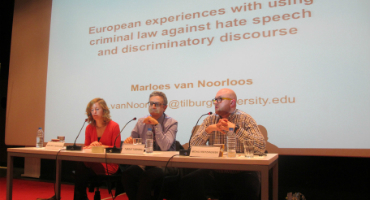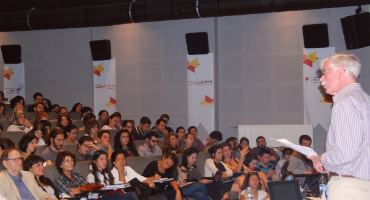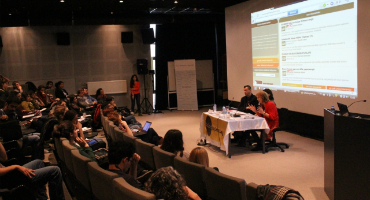Organized by ASULIS Discourse, Dialog and Democracy Laboratory of Hrant Dink Foundation, the talk titled 'Conceptual Discussions: Literature and Discourse', which is the second session of the conceptual discussion series, was held on January 15, 2018 in Anarad Hığutyun Building. It was moderated by Murat Cankara and speakers Sibel Irzık and Seval Şahin discussed the relationship between literature and discourse.
Opening the talk, Murat Cankara pointed out that discourse is born where what is linguistic and non-linguistic come into contact and literature is one of the most convenient domains for talking about this contact.
The first speaker Sibel Irzık stated that with discourse we seek to understand what language produces, what it affects and how it affects them, and what it enables. She also stated that signifying structures which Foucault terms discursive orders aim to examine conditions of existence and historical specificity of the modes of using language. She added that according to Foucault discourses systematically shape, create and build the objects about which they talk. Stating that Edward Said’s notion of orientalism is one of the best examples to possibilities that a discourse-based approach provides for the domain of literature and culture, Irzık said that Said tries to analyze forms of knowledge, representation and subjectivity peculiar to imperial and colonial cultures by using Foucault’s discourse theory. According to Irzık, the most important point that we can learn from Foucault and Said in terms of the function of literature and discourse in literature is the contribution that literature makes to the processes of building reality and knowledge and to the creation of subjectivities in conformity with those processes. Stating that Mihail Bakhtin is another name who emphasizes the importance of discourse in literature, Irzık noted that Bakhtin’s central concern is how the voices of speaking subjects is structured in social context and how they relates to other voices. Irzık stated that Bakhtin, through the notion of discourse, seeks to understand how and to what extent a voice can dominate other voices and the role of social groups, power and institution in this competition of voices.
Second speaker Seval Şahin noted that with the emergence of novel in Turkish as a new narration genre the authors encountered the problem of creating and forming their own discourse. Şahin stated that, before the introduction of novel into Turkish, authors’ effort of making themselves visible in there and constantly-heard voice of the author started with the experience of modernity. Stating that reckoning with the old discourse is necessary for understating the experience of modernity, Şahin said that reason was the first thing that crushed the spiritual and religious discourse. She also added that the experience of modernity introduced the problem of representation of God to novel literature.
|
|
|
|


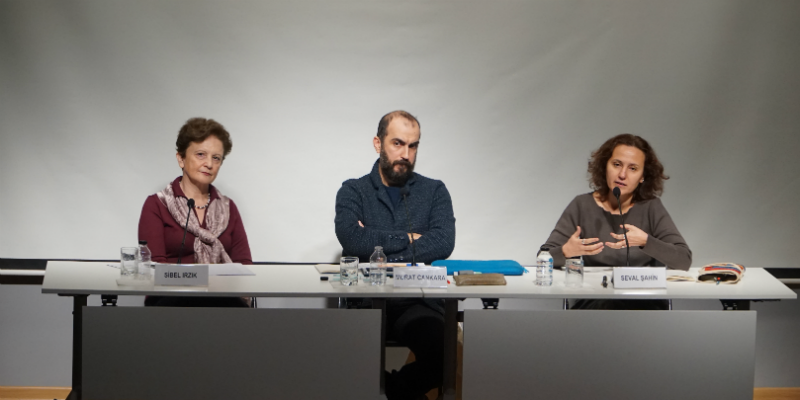
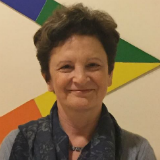 Sibel Irzık offers courses on comparative literature and cultural studies at Sabancı University. She authored the book Deconstruction and the Politics of Criticism (1990, 2016) and edited a Bakhtin reader titled Karnavaldan Romana (2001) and a collection consisting of studies on literature and gender titled Kadınlar Dile Düşünce (2004). She also worked as an editor for South Atlantic Quarterly's special issue titled Relocating the Fault Lines: Turkey Beyond the East-West Divide (2003). More recently, she published articles on Orhan Pamuk, Yaşar Kemal, Latife Tekin, A. H. Tanpınar, Oğuz Atay and coup-period novels in Turkey. Between 2010 and 2016, she worked as the academic coordinator of Sabancı University Center for Gender and Women Studies. Her recent publications and studies focus on the relations between representation and politics, history and social memory, art and opposition; theoretical and historical frameworks of comparative literature; and formation of national and international literature canons.
Sibel Irzık offers courses on comparative literature and cultural studies at Sabancı University. She authored the book Deconstruction and the Politics of Criticism (1990, 2016) and edited a Bakhtin reader titled Karnavaldan Romana (2001) and a collection consisting of studies on literature and gender titled Kadınlar Dile Düşünce (2004). She also worked as an editor for South Atlantic Quarterly's special issue titled Relocating the Fault Lines: Turkey Beyond the East-West Divide (2003). More recently, she published articles on Orhan Pamuk, Yaşar Kemal, Latife Tekin, A. H. Tanpınar, Oğuz Atay and coup-period novels in Turkey. Between 2010 and 2016, she worked as the academic coordinator of Sabancı University Center for Gender and Women Studies. Her recent publications and studies focus on the relations between representation and politics, history and social memory, art and opposition; theoretical and historical frameworks of comparative literature; and formation of national and international literature canons.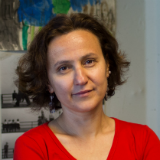 Seval Şahin is a faculty member of Mimar Sinan Fine Arts University Department of Turkish Language and Literature. She authored the books Kültürel Sermaye, Kibar Hırsız ve Şehir (Bağlam Publishing, 2011), Modernizmin Oyunu-Oyunun Modernizmi, Tanpınar’da Oyun (Kapı Publishing, 2013) ve Cinai Meseleler -Osmanlı-Türk Polisiye Edebiyatında Biçim ve İdeoloji (1884-1928) (İletişim Publishing, 2017).
Seval Şahin is a faculty member of Mimar Sinan Fine Arts University Department of Turkish Language and Literature. She authored the books Kültürel Sermaye, Kibar Hırsız ve Şehir (Bağlam Publishing, 2011), Modernizmin Oyunu-Oyunun Modernizmi, Tanpınar’da Oyun (Kapı Publishing, 2013) ve Cinai Meseleler -Osmanlı-Türk Polisiye Edebiyatında Biçim ve İdeoloji (1884-1928) (İletişim Publishing, 2017). 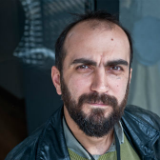 Murat Cankara graduated from Ankara University Department of Theater and is a faculty member at Ankara Social Sciences University. He received his PhD from Bilkent University with his dissertation on Turkish novels written with Armenian letters. His research interests are modern Ottoman/Turkish and Armenian literatures, historiography, humor and comedy, language and violence.
Murat Cankara graduated from Ankara University Department of Theater and is a faculty member at Ankara Social Sciences University. He received his PhD from Bilkent University with his dissertation on Turkish novels written with Armenian letters. His research interests are modern Ottoman/Turkish and Armenian literatures, historiography, humor and comedy, language and violence.